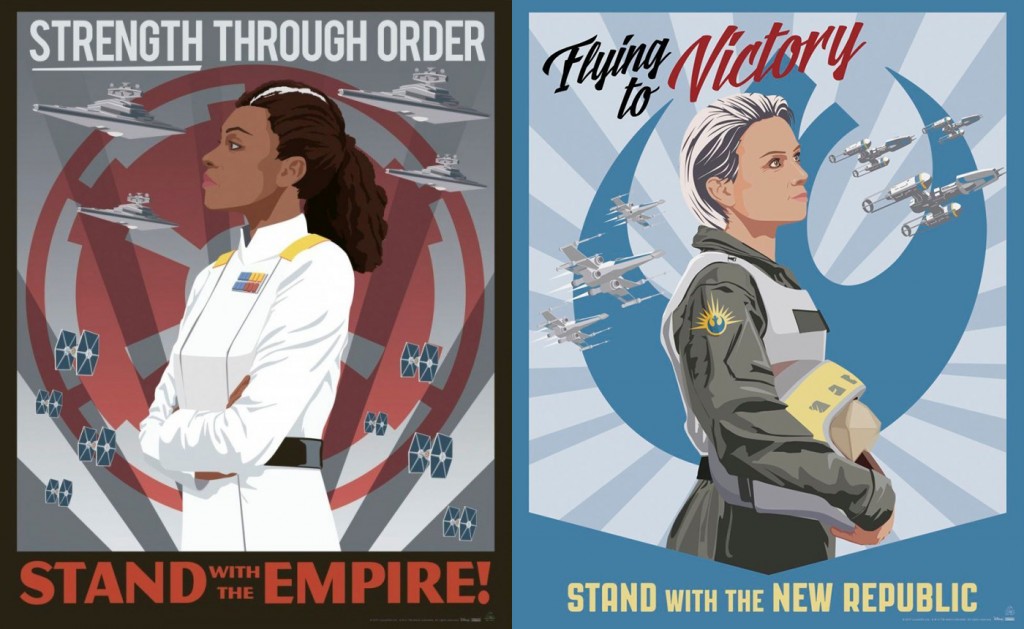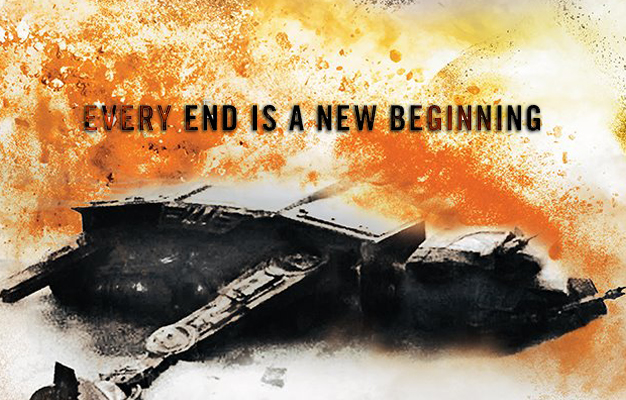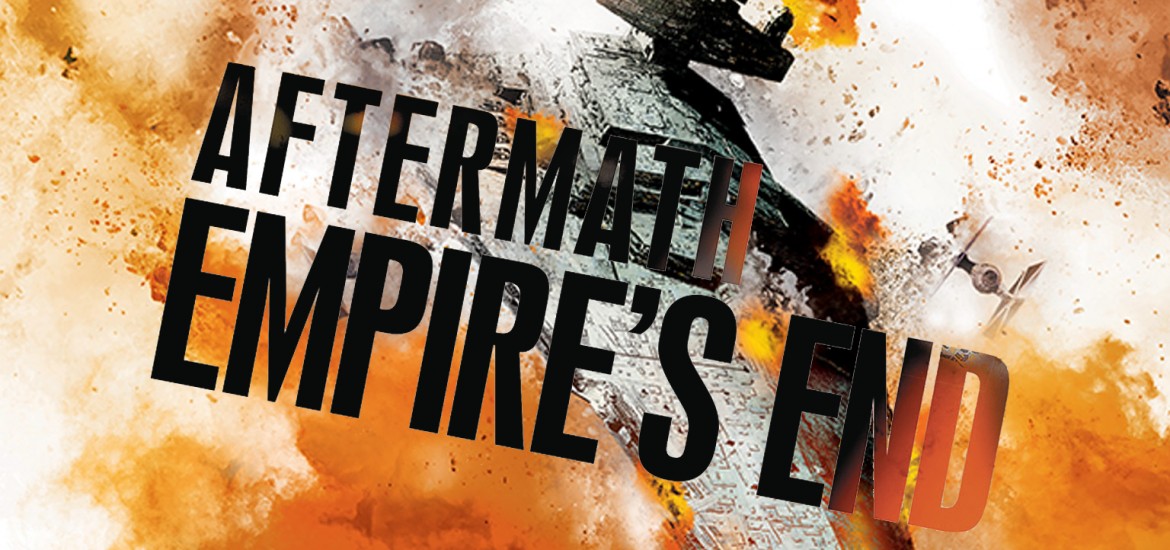This review does contain spoilers.
Star Wars fans’ first taste of the end of the Empire came in Lost Stars as the Imperial characters in that book experienced the Battle of Jakku. It was the first taste of the end of all things for the Empire as seen in The Original Trilogy. Now, in Chuck Wendig’s final Aftermath book, Empire’s End, fans finally have the particulars of what led to the showdown between the Empire and the New Republic over this remote world.
Is This All There Is?
This series has followed two big characters, Rae Sloane and Norra Wexley. Each of these women has been moving closer to the other throughout the story, and it’s in this book that they come face to face at last. What’s most interesting is that even though they are on opposite sides of the war, they find themselves driven by the same thing, revenge. Each woman wants revenge on the person they believe has taken everything away from them. Norra desires revenge on Rae for attacking the New Republic and for brainwashing her husband to help carry out the plan. Rae’s object of revenge is Gallius Rax, who has taken the Empire she loves away from her. As these two women wrestle with how to get their revenge they see that they are truly not that different from one another and are even left with the same question plaguing them: “Is this all there is?” Is revenge truly enough to live for? Their answers will be different in the end, but the outcome will be the same. Revenge is not enough.

Who is the Enemy?
Building off the previous theme is also this question, “Who is the enemy?” Norra will find that in the end, her understanding of the answer to that question was wrong and she must put aside her presuppositions about Rae, specifically, to fight the right fight.
It’s compelling is to see the way this struggle is mirrored on a galactic scale and how it will plague the sequel trilogy of Star Wars. The New Republic and Mon Mothma specifically have grappled with the challenge of identifying who the enemy is and what actual threat that enemy poses. All throughout the Aftermath series she’s longed to have peace and put war behind her. She might have been too late to act correctly if not pushed by her opponent in the upcoming election to take a strong stance on the security of the New Republic. Seeing the galaxy the way it is and not as she wants it to be is hard for Mon Mothma, but in the fight to bring democracy, the lesson that freedom is never free cannot be lost.
Finding the medium between safety and freedom is never easy. Sinjar says of Mon Mothma she is, “…a woman that wants to give democracy to the entirety of the galaxy. Freedom for all. Oppression for none.” It truly is the noblest of goals. The book does a good job of showing this struggle in all its messiness.
It is fascinating to see how this connects to The Force Awakens. Ancillary materials fill in the details of a senate that does not wish to see the First Order as a threat. Because of their lack of understanding of what’s truly happening in the galaxy, or worse, a blatant disregard for the signs before them, their blindness becomes their doom. A poignant lesson in any galaxy.
Spoilers begin after this point
The Good
The book has some things worthy of praise. The plot. The plot of the book is honestly what many expected from the first book. The portrayal of the inner-workings of the New Republic, seeing characters like Mon Mothma and Leia in their roles, trying to take care of the Empire while at the same time transitioning to a new galactic government, is excellent.
The book also continues one of the best things about the series, the Empire. The power plays and infighting between Grand Admiral Sloan and Gallius Rax as they try to find a way forward for the fledgling Empire are great. Another standout comes in the character of Rax and the revelation of his connection with Palpatine, Jakku, and what’s happening there, ultimately leading to the formation of the First Order.
The Bad
Empire’s End, like the rest of the series suffers from Wendig’s prose; it’s just frustratingly prosaic. There is also a lack of exposition and detail with major plot points, such as the Black Sun and Red Key crime syndicate’s involvement in the attempt to destabilize the galaxy or the full scope of Palpatine’s contingency plan. Each would benefit from more explanation and detail. There are also times throughout where there seems to be a jump in the story and fuller connection of the dots would be welcome. This is so important because tie-in fiction that’s being written concurrently with a tv series or films will always come in second to those mediums. The major revelations will inevitably be saved for the next movie or episode, and because of this, it’s a struggle for the books to feel important. The Aftermath books suffer from this problem. There really are no major revelations in them and it leaves the series feeling a bit hollow. Therefore good writing is essential to making the reader feel they are being rewarded for their time and that the book is necessary to the canon.
The interludes continue to be an issue. Most of them are unnecessary. With all of the pre-release hullabaloo about Jar Jar’s fate, the actual reveal lacks any punch. The interludes that do work would be better served by being worked into the narrative in a more organic way. The space for the others could better be utilized to flesh out the main plot with more detail.
Most frustratingly, the character’s voices still sound off. Han and Leia do not sound like themselves. Tie-in fiction, when it is at its best, plays like an extension of the show or film it draws from. The best way for that to happen is to capture the “voices” of the characters so that the reader can hear the actor in their heads as they read. Unfortunately for this book, just as in Life Debt, this does not happen.
Conclusion
Empire’s End is an improvement on the previous two books in the series. The plot is more engaging and seeing the end to the Empire is enjoyable. But with continuing prose, “voice” and importance issues, it’s still not one of the new canon’s best, landing somewhere in the middle with a rating of 2.75 downed Star Destroyers out of 5.
This review is by Matthew Rushing of Trek.fm‘s The 602 Club and TheNerdParty.com‘s AggressiveNegotiations. He can be found on Twitter @mattrushing02.
This review was completed using a copy of Aftermath: Empire’s End provided by Del Rey.

Author: Matt Rushing
Matthew Rushing is the host of Trek.fm‘s The 602 Club and co-host of TheNerdParty.com‘s AggressiveNegotiations: A Star Wars Podcast. He can be found on Twitter @mattrushing02.

Interesting to note that Disney/Lucasfilm would NOT let an incompetent writer like Wendig even so much as hint at anything related to Luke Skywalker in these utterly poorly written novels. Odd isn’t it that Timothy Zahn was able to make the period after Return of the Jedi so interesting that even in “Legends” status, people long for the characters to become canon? Disney has made one colossal mistake with Star Wars and that is to make Luke Skywalker some wandering nomad obsessed with finding something/anything to help him make sense of the Force…at no point ANYWHERE in the original trilogy or even the prequels were the Jedi such sissies. Again, the EU made the Jedi interesting and enjoyable even if going in odd directions at times: I’m looking at whoever decided to make Jaicen Solo a pathetic “OMG I used the Force, what’ll I do now” type character. One can only hope that Wendig is never allowed to touch anything to do with Star Wars again, or at least keep him clear of anything people pay any attention…”Rogue One” was infinitely more enjoyable than the storyline so far post ROTJ it is simply ridiculous. Maybe, just maybe; if Disney is smart and throws Thrawn into the Unknown Regions along with an actual storyline and puts Dave Filoni in charge…well, then Star Wars might just be interesting again. Yeah, like that will happen!
During the time of the EU, I think Lucasfilm gave the publisher and authors more free rein to do whatever as long as it met certain guidelines. Today, I think they are more restricted so as not to step on what Lucasfilm as coming up in future stories for the galaxy and the characters on film and TV.
I think you are quite correct…however, it doesn’t change the fact that Wendig is a poor writer with little knowledge of how to write a “Star Wars” novel and certainly not one that is interesting or good.
I agree. You can hear more of what Matt and I thought on The 602 Club podcast. We recorded it last night with Mark Hurliman and it will be released this week.
I will give that a listen.